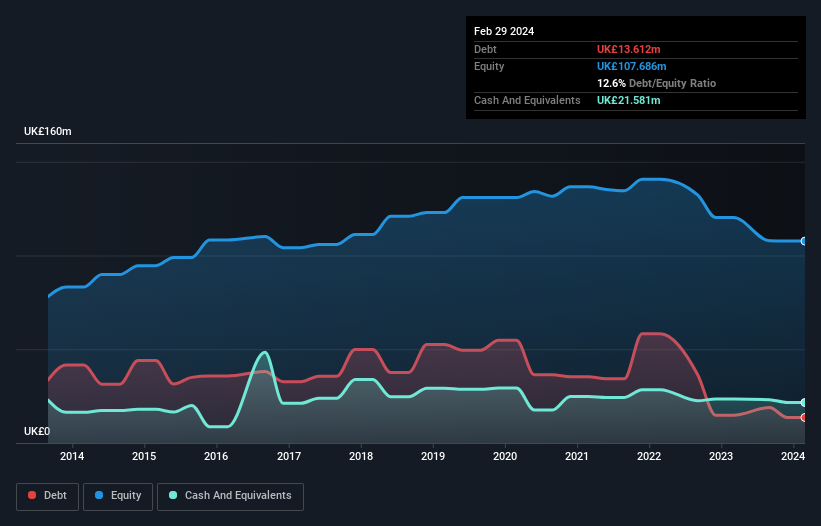Howard Marks put it nicely when he said that, rather than worrying about share price volatility, 'The possibility of permanent loss is the risk I worry about... and every practical investor I know worries about.' It's only natural to consider a company's balance sheet when you examine how risky it is, since debt is often involved when a business collapses. Importantly, Carr's Group plc (LON:CARR) does carry debt. But is this debt a concern to shareholders?
When Is Debt A Problem?
Debt is a tool to help businesses grow, but if a business is incapable of paying off its lenders, then it exists at their mercy. In the worst case scenario, a company can go bankrupt if it cannot pay its creditors. However, a more usual (but still expensive) situation is where a company must dilute shareholders at a cheap share price simply to get debt under control. Having said that, the most common situation is where a company manages its debt reasonably well - and to its own advantage. The first step when considering a company's debt levels is to consider its cash and debt together.
Check out our latest analysis for Carr's Group
What Is Carr's Group's Net Debt?
As you can see below, Carr's Group had UK£13.6m of debt at February 2024, down from UK£14.9m a year prior. But it also has UK£21.6m in cash to offset that, meaning it has UK£7.97m net cash.

How Strong Is Carr's Group's Balance Sheet?
We can see from the most recent balance sheet that Carr's Group had liabilities of UK£33.9m falling due within a year, and liabilities of UK£14.8m due beyond that. Offsetting these obligations, it had cash of UK£21.6m as well as receivables valued at UK£37.0m due within 12 months. So it actually has UK£9.80m more liquid assets than total liabilities.
This surplus suggests that Carr's Group has a conservative balance sheet, and could probably eliminate its debt without much difficulty. Succinctly put, Carr's Group boasts net cash, so it's fair to say it does not have a heavy debt load! When analysing debt levels, the balance sheet is the obvious place to start. But it is future earnings, more than anything, that will determine Carr's Group's ability to maintain a healthy balance sheet going forward. So if you want to see what the professionals think, you might find this free report on analyst profit forecasts to be interesting.
Over 12 months, Carr's Group reported revenue of UK£145m, which is a gain of 4.1%, although it did not report any earnings before interest and tax. That rate of growth is a bit slow for our taste, but it takes all types to make a world.
So How Risky Is Carr's Group?
While Carr's Group lost money on an earnings before interest and tax (EBIT) level, it actually generated positive free cash flow UK£1.4m. So although it is loss-making, it doesn't seem to have too much near-term balance sheet risk, keeping in mind the net cash. We'll feel more comfortable with the stock once EBIT is positive, given the lacklustre revenue growth. The balance sheet is clearly the area to focus on when you are analysing debt. However, not all investment risk resides within the balance sheet - far from it. These risks can be hard to spot. Every company has them, and we've spotted 1 warning sign for Carr's Group you should know about.
When all is said and done, sometimes its easier to focus on companies that don't even need debt. Readers can access a list of growth stocks with zero net debt 100% free, right now.
New: AI Stock Screener & Alerts
Our new AI Stock Screener scans the market every day to uncover opportunities.
• Dividend Powerhouses (3%+ Yield)
• Undervalued Small Caps with Insider Buying
• High growth Tech and AI Companies
Or build your own from over 50 metrics.
Have feedback on this article? Concerned about the content? Get in touch with us directly. Alternatively, email editorial-team (at) simplywallst.com.
This article by Simply Wall St is general in nature. We provide commentary based on historical data and analyst forecasts only using an unbiased methodology and our articles are not intended to be financial advice. It does not constitute a recommendation to buy or sell any stock, and does not take account of your objectives, or your financial situation. We aim to bring you long-term focused analysis driven by fundamental data. Note that our analysis may not factor in the latest price-sensitive company announcements or qualitative material. Simply Wall St has no position in any stocks mentioned.
About LSE:CARR
Carr's Group
Engages in the agriculture business in the United Kingdom and internationally.
Excellent balance sheet with moderate growth potential.
Market Insights
Community Narratives




